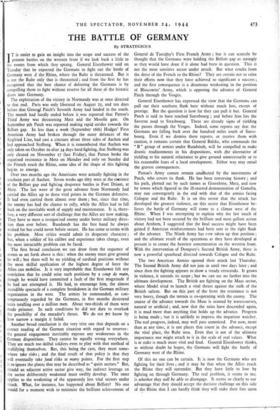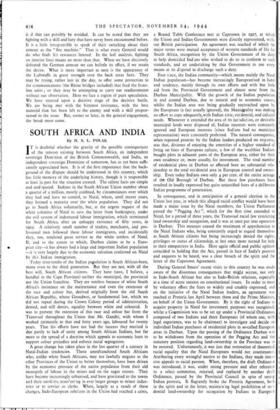THE BATTLE OF GERMANY
By STRATEGICUS
IT is easier to gain an insight into the scope and success of the present battles on the western front if we look back a little to the events from which they sprang. General Eisenhower said on Tuesday that he expected the Germans to fight out the battle of Germany west if the Rhine, where the Ruhr is threatened. But it is not the Ruhr only that is threatened ; and from the first he has recognised that the best chance of defeating the Germans is by compelling them to fight without reserve for all three of the historic
doors into Germany. •
The exploitation of the victory in Normandy was at once directed to that end. Paris was only liberated on August 25, and ten days before that General Patch's Seventh Army had landed in the south. The month had hardly ended before it was reported that Patton's Third Army was threatening Metz and the Moselle gate. On September 9th Patch was reported making rapid strides towards the Belfort gap. In less than a week (September i6th) Hodges' First American Army had broken through the outer defences of the Siegfried Line, had cast a cincture about three sides of Aachen and had approached Stolberg. When it is remembered that Aachen was only taken on October 20 after 34 days hard fighting, that Stolberg was only cleared on November 57 (last Friday), that Patton broke the organised resistance in Metz on Monday and only on Sunday did the French reach the Rhine, some idea of the shape of this fighting begins to emerge.
Over two months ago the Americans were actually fighting in the southern part of Aachen. Seven weeks ago they were at the entrance of the Belfort gap and fighting desperate battles in Fort Driant, at Metz. ,The last wave of the great advance from Normandy ,had carried the Allies up to these vital points in the German defensive. It had even carried them almost over them ; but, since that time, the enemy has had the chance to rally, while the Allies had to fall back on the inevitable work of supply and maintenance, It is, there- fore, a very different sort of challenge that the Allies are how making. They have to meet a reorganised enemy under better military direc- tion than ever before. Rundstedt has the free hand he always wished for but could never befoie secure. He has come to terms with his problem. Most critics would admit its desperate character ; but, when a soldier of his calibre and experience takes charge, even the most intractable problem can be faced.
The first broad conclusion we can draw from the sequence of events as set forth above is this : when the enemy must give ground he will ; but there will be no yielding of cardinal positions without the most skilful application of the highest degree of force the Allies can mobilise. It is very improbable that Eisenhower felt any conviction that he could seize such positions by a coup de main, though he would have committed a fault of the first magnitude if he had not attempted it. He had, to encourage him, the almost incredible spectacle of a complete breakdown in the German military organisation in the west. The armies he commanded, so con- temptuously regarded by the Germans, in five months destroyed units totalling over a million men. About two-thirds of them were made prisoner. In such conditions he did not dare to overlook the possibiltly of the matador's thrust. We do not yet know by how narrow a margin it failed.
Another broad conclusion is the very trite one that depends on a correct reading of the German situation with regard to reserves : the general engagement inevitably exposes any weaknesses in the German dispositions. They cannot be equally strong everywhere. They are much too skilful soldiers even to play with that method of stultifying themselves. But, this being the case, they must some- where take risks ; and the final result of that policy is that they will eventually take fatal risks at many points. For the first step is to ignore the places that may be described as " quiet sectors." But, should an adjacent active sector give way, the indirect leverage on the sector deliberately weakened must swiftly develop. The same applies to the weakening of the apparently less vital sectors under attack. What, for instance, has happened about Belfort? No one would for a moment wish to minimise the brilliant achievement of
General de Tassiby's First French Army ; but it can scarcely be thought that the Germans were holding the Belfort gap as strongly as they would have done if it alone had been in question. This is not the most sensitive sector under attack. But what results from the drive of the French to the Rhine? They are certain not to relax their efforts now that• they have achieved so significant a success ; and the first consequence is a disastrous weakening in the position of Blascowitz' Army, which is opposing the advance of General Patch through the Vosges.
General Eisenhower has expressed the view that the Germans can pull out their southern flank here without much loss, except of prestige. But the question is how far they can pull it but. General Patch is said to have reached Sarrebourg ; and before him lies the Saverne road to Strasbourg. There are already signs of yielding the passes through the Vosges. Indeed, some reports say that the Germans are falling back over the hundred miles south of Sarre- bourg. Even if we dismiss these reports, or receive them with caution, it remains certain that General Balcke, who commands the " B" group of armies under Rundstedt, will be compelled to make drastic readjustments in his dispositions, with the alternative of yielding to his natural reluctance to give ground unnecessarily or to his reasonable fears of a local envelopment. Either way may entail the gravest consequences.
Patton's Army cannot remain unaffected by the movements of Patch, who covers its flank. He has been traversing history ; and his path, plotted out by such names as Gravelotte, Metz, and now by towns which figured in the ill-starred demonstration of Gamelin, may run convergently in the end with that of the armies facing Cologne and the Ruhr. It is on this sector that the attack has developed the greatest violence, on this sector that Eisenhower be- lieves the battle of Germany will 'come to a climax west of the Rhine. When I was attempting to explain why the last touch of victory had not been secured by the brilliant and most gallant action about Arnhem, I suggested that the final success might have been gained if American reinforcements had been sent to the right flank of the advance. The Ninth Army has r ow taken up that position ; and the ultimate result of the operations as they have developed at present is to create the heaviest concentration on the western front. With the intervention of Dempsey's Second British Army, there is now a powerful spearhead directed towards Cologne and the Ruhr.
The two American Armies opened their attack last Thursday. The Second British Army did not join in until two days later ; and since then the fighting appears to show a steady crescendo. It grows in violence, it extends its scope ; but we can see no farther into the ultimate development. The British are fighting on the Maas sector, where Model tried to launch a vital thrust against the stalk of the British salient. But on this part of the front the resistance is not very heavy, though the terrain is co-operating with the enemy. The course of the advance towards the Maas is seamed by watercourses, natural or artificial ; and, now that the rains have descended again, it is mud more than anything that holds up the advance. Progress is being made ; but it is unlikely to impress the impatient watcher. The real progress, indeed, may well pass unnoticed. For now, more than at any time, it is not places that count in the advance, except the vital place, the Ruhr area. Even that is not of the ultimate importance one might attach to it in the scale of real values. What is at stake is much more vital and final. General Eisenhower thinks, as without doubt he hopes, the Germans will fight the battle of Germany west of the Rhine.
Of this no one can be certain. It is now the Germans who are fighting for their lives ; and it may be that when the Allies reach the Rhine they will surrender. But they have little to lose by fighting on through Germany. The real problem, it seems to me, is whether they will be able to disengage. It seems so clearly to our advantage that they should accept the decisive challenge on this side of the Rhine that I can hardly think they will stake their fate upon it if that can possibly be avoided. It can be noted that they are fighting with a skill and fury that have never been encountered before. It is a little irresponsible to speak of their switching about their armour as the " fire machine." That is what every General would do who finds his resources limited. In the lag/ analysis, fighting on interior lines means no more than that. When we have decisively defeated the German armour we can belittle its effect, if we retain the desire. What is more important to note is the appearance of the Luftwaffe in great strength over the back areas here. They may be trying, rather late in the day, to offer some protection to the communications (the Rhine bridges included) that feed the front- line units ; or they may be attempting to carry out readjustments without our observation. Here we face a region of pure speculation. We have entered upon a decisive stage of the decisive battle. We are being met with the bitterest resistance, with the best material that has been left to the enemy and with a skill propor- tioned to the issue. But, sooner or later, in the general engagement, the break must come.



























 Previous page
Previous page